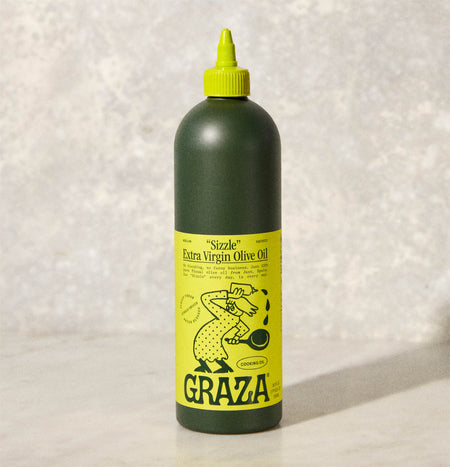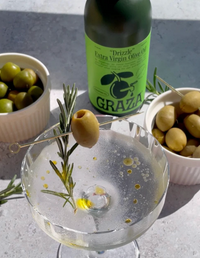
Why EVOO Reigns Supreme
Not all oils are created equal. And in the world of oils, EVOO is basically liquid gold—working hard in your body long after your meal to prevent heart disease, stress, and protect your brain. Read on to learn more about just what makes olive oil the best pick for your health.
by Martin Martinez of braincrumbss
One person dies every 36 seconds in the United States from cardiovascular disease. In 2019, the leading cause of death globally was heart disease. We're here to break down exactly what the science is behind extra virgin olive oil, and why the world's leading experts in heart health—such as the American Heart Association and the American College of Cardiology—support making it a part of your diet.
A deeper look into the contents of olive oil
What is a phenol?
Phenols are organic molecules characterized by the existence of a hydroxyl group (the OH) attached directly to the benzene ring. They're important because they exist in high levels in EVOO, and they're one of the main ingredients that provides heart and health benefits.
While regular olive oil that's be highly processed often loses phenols (in addition to other helpful compounds), EVOO is pressed mechanically and processed without high heat or chemical solvents—which means that the phenols are kept intact.
The relationship between phenols and oxidative stress.
Oxidative stress is when there is an imbalance between production and accumulation of oxygen reactive species in cells and tissues and your body's ability to regulate these reactive products.
Think of it like your clean up crew. When your body defense can’t keep up with the free radicals (no good), the cells and tissues are damaged or destroyed. Oxidative stress can be a result from smoking, chronic stress, infections, environmental toxins, environmental toxins and so much more!
Oxidative stress affects every organ system including your heart. It contributes to coronary artery disease (plaque buildup), heart vessel damage, high bad cholesterol, and hypertension. EVOO has high levels of phenols that helps combat all the stressors and prevent damage.
EVOO is also high in monounsaturated fats—especially oleic acid. This is found in avocados and nuts, and aids through anti-inflammatory and antioxidant properties.
Real world studies using EVOO
The CORDIOPREV study (Coronary Diet Intervention With Olive Oil and Cardiovascular Prevention) is ongoing prospective, randomized, single-blind, controlled trial including 1,002 coronary heart disease patients, who had their last coronary event >6 months before enrollment. The main objective of the study was to evaluate the efficacy of a Mediterranean diet, and results showed the group that consumed EVOO has decreased heart plaque progression.
Or consider a Spanish study which looked at over 60,000 people. The researchers wanted to examine whether olive oil consumption was associated with heart, vessel plaque buildup, and risk of heart disease, stroke, and coronary artery disease. Results showed that olive oil was associated with lower risk of cardiovascular disease and stroke. Another study looked at over 30,00 participants and followed them for 24 years to study if olive oil intake was associated with total cardiovascular disease, coronary heart disease (CHD), and stroke risk. The results found higher olive oil intake was associated with lower risk of coronary heart disease and total cardiovascular disease.
Another interesting study was performed on cholesterol fed rats comparing EVOO with other oils. The results showed the rats who were fed EVOO showed decreased malondialdehyde (MDA) and tumor necrosis factor-α (TNF-α) levels in hearts of cholesterol-fed rats.
A look at other cooking oils
Olive oil: You're familiar. Full of phenols, MUFA, and other great antioxidant fighting macro and micro nutrients. It has the least amount of trans fats content of all oils.
Coconut oil: Several varieties include refined, bleached, and deodorized coconut oil or, more recently, virgin (unrefined) coconut. oil. Usually what gets touted is the benefits of medium-chain fatty acids (MCFAs). But looking at the composition of MCFA in coconut oil, half are made up of lauric acid—which can increase risk of diabetes and overall bad cholesterol. Here's a full article if you want to read more.
Vegetable oil: Comes from plants. Usually a blend of canola, corn, soybean, safflower, palm and sunflower oils. But not always. The crude extraction process uses hexane, which is an additive used in gasoline, glue, varnishes, inks, and so much more. While the vegetable oil may initially be “healthy,” the actual benefits are destroyed from the processing. Others are refined, bleached, and deodorized oils (yes, more processing). Corn and safflower oil are rich in omega-6 linoleic acid but contain almost no omega-3 α-linolenic acid and are not associated with beneficial effects on heart health according to recent evidence. Also, repeatedly heated cooking oil results in the formation of free radicals, which cause oxidative stress and induce damage at the cellular and molecular levels.
Canola oil: If you can find “cold-pressed” canola oil (it's almost impossible to find), then yes—it can have good amounts of monounsaturated fats and a decent amount of polyunsaturated fats. Otherwise, the chemical extraction uses a solvent called hexane which will destroy its omega-3s and creates trans fat. Not only does the process remove the good stuff, it adds bad stuff.
Phew! Thanks for reading all of this. The time and effort to create this resource was no joke :) See references below.
1. Amy Willis, Michael Greene, Kimberly Braxton-lloyd, An Experimental Study of a Mediterranean-style Diet Supplemented with Nuts and Extra-virgin Olive Oil for Cardiovascular Disease Risk Reduction: The Healthy Hearts Program (P12-021-19), Current Developments in Nutrition, Volume 3, Issue Supplement_1, June 2019, nzz035.P12–021–19, https://doi.org/10.1093/cdn/nzz035.P12-021-19
2. Romani, A., Ieri, F., Urciuoli, S., Noce, A., Marrone, G., Nediani, C., & Bernini, R. (2019). Health Effects of Phenolic Compounds Found in Extra-Virgin Olive Oil, By-Products, and Leaf of Olea europaea L. Nutrients, 11 (8), 1776. https://doi.org/10.3390/nu11081776
3. Katsarou, A. I., Kaliora, A. C., Chiou, A., Kalogeropoulos, N., Papalois, A., Agrogiannis, G., & Andrikopoulos, N. K. (2015). Amelioration of oxidative and inflammatory status in hearts of cholesterol-fed rats supplemented with oils or oil-products with extra virgin olive oil components. European Journal of Nutrition, 55 (3), 1283–1296. https://doi.org/10.1007/s00394-015-0947-5
4. Ghorbel, I., Chaâbane, M., Kammoun, N. G. , & Zeghal, N. (2022). Beneficial Effects of Extra Virgin Olive Oil Rich in Phenolic Compounds on Cardiovascular Health. In M. Ince, & O. K. Ince (Eds.), Mediterranean Diet [Working Title]. IntechOpen. https://doi.org/10.5772/intechopen.104883
5. Santiago-Fernandez, C., Rodríguez-Díaz, C., Ho-Plagaro, A., Gutierrez-Repiso, C., Oliva-Olivera, W., Martin-Reyes, F., Mela, V., Bautista, R., Tome, M., Gómez-Maldonado, J., Tinahones, F. J., Garcia-Fuentes, E., & Garrido-Sánchez, L. (2022). EVOO Promotes a Less Atherogenic Profile Than Sunflower Oil in Smooth Muscle Cells Through the Extracellular Vesicles Secreted by Endothelial Cells. Frontiers in Nutrition , 9. https://doi.org/10.3389/fnut.2022.867745
6. Jimenez-Torres, J., Alcalá-Diaz, J. F., Torres-Peña, J. D., Gutierrez-Mariscal, F. M., Leon-Acuña, A., Gómez-Luna, P., Fernández-Gandara, C., Quintana-Navarro, G. M., Fernandez-Garcia, J. C., Perez-Martinez, P., Ordovas, J. M., Delgado-Lista, J., Yubero-Serrano, E. M., & Lopez-Miranda, J. (2021). Mediterranean Diet Reduces Atherosclerosis Progression in Coronary Heart Disease: An Analysis of the CORDIOPREV Randomized Controlled Trial. Stroke. https://doi.org/10.1161/strokeaha.120.033214
7. Katsiki, N., Pérez-Martínez, P. & Lopez-Miranda, J. Olive Oil Intake and Cardiovascular Disease Prevention: “Seek and You Shall Find”. Curr Cardiol Rep 23, 64 (2021). https://doi.org/10.1007/s11886-021-01496-1
8. Guasch-Ferré M, Liu G, Li Y, et al. Olive Oil Consumption and Cardiovascular Risk in U.S. Adults. J Am Coll Cardiol. 2020 Apr, 75 (15) 1729–1739. https://doi.org/10.1016/j.jacc.2020.02.036
9. The top 10 causes of death. (n.d.). WHO | World Health Organization. https://www.who.int/news-room/fact-sheets/detail/the-top-10-causes-of-death
10. Eyres, L., Eyres, M. F., Chisholm, A., & Brown, R. C. (2016). Coconut oil consumption and cardiovascular risk factors in humans. Nutrition reviews, 74 (4), 267–280. https://doi.org/10.1093/nutrit/nuw002
11. Neelakantan, N., Seah, J. Y. H., & van Dam, R. M. (2020). The Effect of Coconut Oil Consumption on Cardiovascular Risk Factors. Circulation, 141 (10), 803–814. https://doi.org/10.1161/circulationaha.119.043052
12. University of Toronto. "Some 'healthy' vegetable oils may actually increase risk of heart disease." ScienceDaily. ScienceDaily, 11 November 2013. <www.sciencedaily.com/releases/2013/11/131111122105.htm>.
















